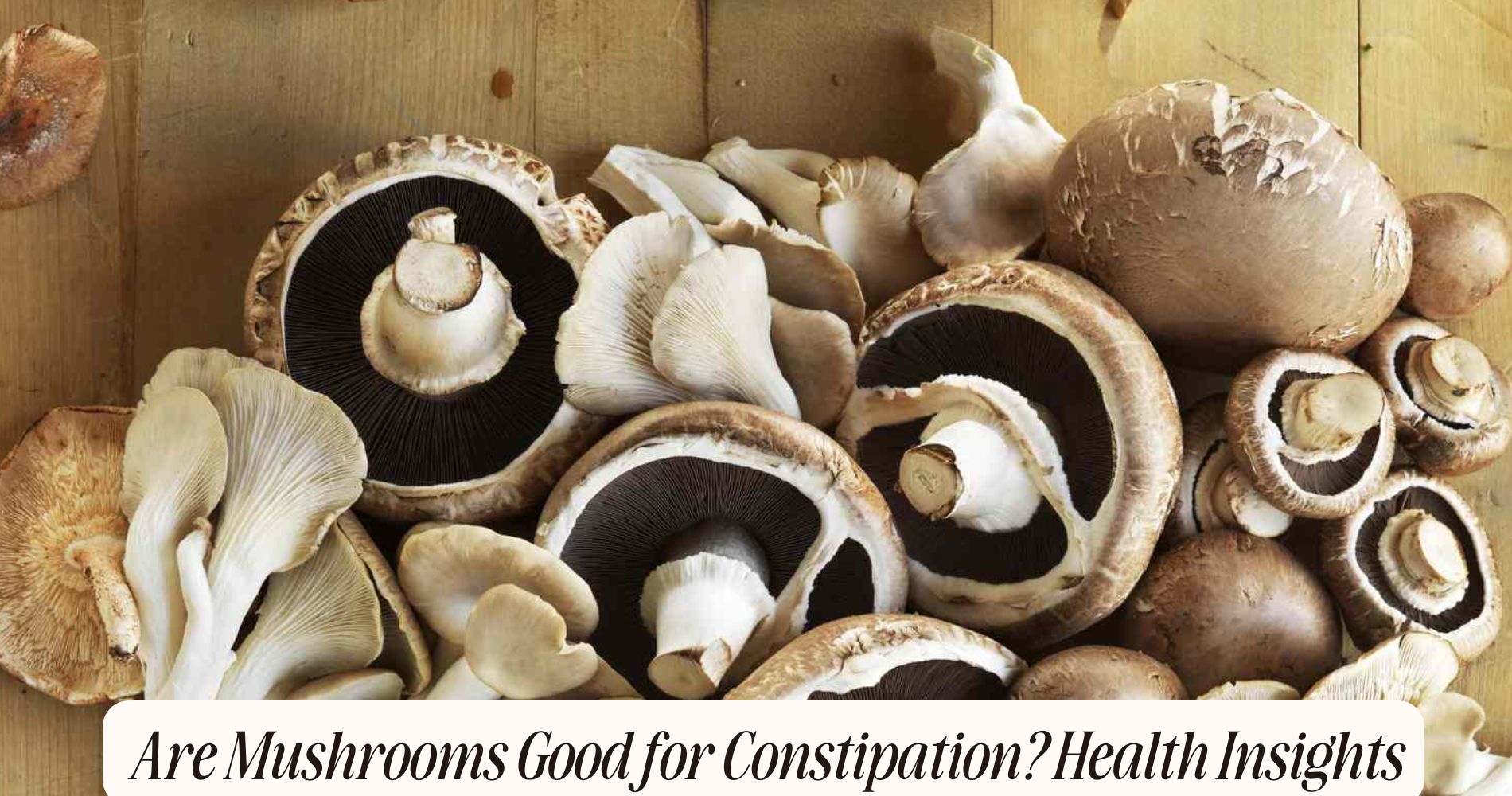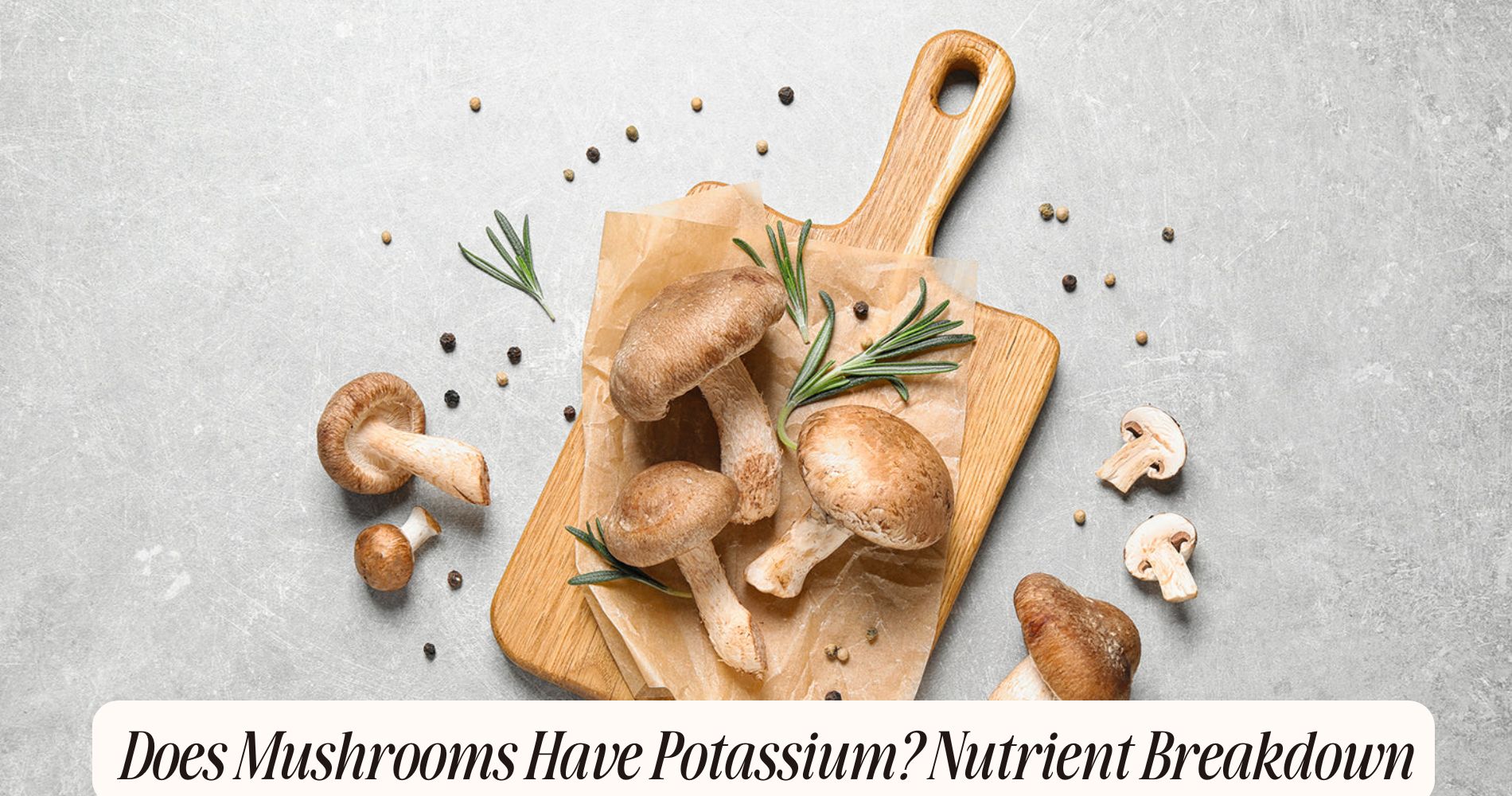
Are Mushrooms Good for Constipation? Health Insights
Are mushrooms good for constipation? Mushrooms are great for constipation, thanks to their high fiber content. They're packed with prebiotic fibers that support good gut bacteria and promote regular bowel movements. Varieties like shiitake, portobello, and maitake help retain moisture in your digestive system, making it easier for stools to pass. Including about a cup of cooked mushrooms in your meals can boost your fiber intake while improving gut health. Just remember to start with smaller portions to avoid any digestive discomfort. If you're curious about specific types and how to incorporate them into your diet, there's plenty more to explore.
Nutritional Profile of Mushrooms
When it comes to nutrition, mushrooms often surprise people with their impressive profile. You mightn't realize that different mushroom varieties pack a punch when it comes to vitamins and minerals. For instance, shiitake mushrooms are rich in B vitamins, while portobello mushrooms offer significant amounts of potassium and copper. These nutrients play crucial roles in your body's overall function, from energy production to immune support.

Mushrooms also contain essential antioxidants, which help fight free radicals and reduce inflammation. This makes them an excellent addition to your diet, whether you're sautéing them in a stir-fry, adding them to soups, or tossing them on a salad.
With such diverse culinary uses, you'll find that mushrooms can easily fit into any meal, enhancing both flavor and nutrition. Moreover, their low-calorie count and high nutrient density make them a smart choice for those looking to maintain a healthy weight.
Fiber Content and Digestive Health
Digestive health hinges considerably on the fiber content of the foods we consume, and mushrooms deliver a remarkable contribution. These fungi are packed with various types of fiber, including prebiotic fibers that play a crucial role in promoting a healthy gut. Prebiotic fibers serve as food for beneficial gut bacteria, helping to maintain a balanced microbiome and enhancing overall digestive function.
When you include mushrooms in your diet, you're not just adding flavor; you're also boosting your intake of fiber, which can support the production of digestive enzymes. These enzymes are essential for breaking down food, making nutrients more accessible and helping your digestive system run smoothly.
The unique composition of mushroom fibers can help regulate bowel movements and prevent constipation, making them an excellent choice for those looking to improve their digestive health.
Incorporating mushrooms into your meals can be easy and enjoyable. Whether in salads, stir-fries, or soups, you'll find that they not only enhance taste but also promote a healthier gut environment.
How Mushrooms Aid Constipation
Mushrooms can be a great ally in easing constipation thanks to their high fiber content.
This fiber not only promotes regular bowel movements but also helps retain moisture in your digestive system.
Plus, the natural hydration properties of mushrooms can further support your overall gut health.
High Fiber Content
Eating a variety of foods rich in fiber can greatly improve your digestive health, and mushrooms are a fantastic addition to that list. When it comes to fiber sources, mushrooms provide an impressive amount. Different mushroom varieties, like shiitake, portobello, and oyster mushrooms, can contribute considerably to your daily fiber intake.
Fiber plays an essential role in promoting regular bowel movements. It adds bulk to your stool, making it easier to pass, which is especially beneficial if you're struggling with constipation. The soluble fiber found in mushrooms can help retain water, softening the stool and making it more manageable.

Incorporating mushrooms into your meals is simple. You can sauté them, toss them in salads, or include them in soups and stews. Not only do they enhance flavor, but they also elevate the fiber content of your dishes.
Natural Hydration Properties
Hydrating your body is essential for maintaining regular bowel movements, and mushrooms can play a significant role in this process. These fungi are composed of about 90% water, making them a fantastic source of natural hydration. When you incorporate mushrooms into your diet, you're not just enjoying their unique flavors; you're also reaping hydration benefits that can help alleviate constipation.
Mushrooms also promote moisture retention in the digestive system, which is vital for softening stool and making it easier to pass. By consuming mushrooms, you're increasing your fluid intake without even realizing it. This moisture-rich content can enhance your overall hydration levels, contributing to more regular bowel movements.
Additionally, certain varieties, like shiitake and portobello, provide essential nutrients that support gut health, further aiding digestion. When you think about foods that can help with constipation, mushrooms should be on your radar.
Types of Mushrooms to Consider
When you're exploring mushrooms for their health benefits, it's crucial to know which types can aid digestion.
Some varieties are particularly rich in nutrients that support gut health, making them excellent choices for alleviating constipation.
Let's look at the best options you can incorporate into your diet for ideal digestive support.
Nutritional Benefits of Mushrooms
Mushrooms are often overlooked in the quest for a balanced diet, yet they offer a remarkable array of nutritional benefits. These fungi are low in calories but high in essential nutrients, including vitamins D, B, and minerals like selenium and potassium. Incorporating various mushroom varieties into your meals can enhance your overall nutrition.
For instance, shiitake mushrooms are known for their immune-boosting properties, while portobello mushrooms provide a meaty texture that's great for vegetarian dishes.
You can prepare mushrooms using diverse cooking methods, whether you're sautéing, grilling, or roasting. Each method brings out different flavors and textures, allowing you to enjoy their benefits in multiple ways.
For instance, sautéing mushrooms with garlic and olive oil can create a delicious side dish, while adding them to soups or salads amplifies their nutritional impact.
Moreover, mushrooms contain antioxidants that combat oxidative stress and may support overall health.
Best Varieties for Digestion
Incorporating mushrooms into your diet not only boosts nutrition but can also support digestive health. Certain mushroom varieties are particularly beneficial for digestion, thanks to their high fiber content and unique compounds.
One standout is the shiitake mushroom; it contains polysaccharides that promote gut health and may help alleviate constipation.
Another great option is the maitake mushroom, known for its prebiotic properties that nourish beneficial gut bacteria. This can enhance your digestive benefits and overall gut function.

Portobello mushrooms are also worth considering; they're rich in fiber and can add bulk to your diet, making it easier to maintain regular bowel movements.
Don't overlook the power of oyster mushrooms either. They contain a good amount of fiber and antioxidants that can support your digestive system.
Other Health Benefits of Mushrooms
Many people might be surprised to learn that mushrooms offer a range of health benefits beyond their fiber content. These remarkable fungi come in various mushroom varieties, each packing unique nutrients and properties. For instance, shiitake mushrooms are known for their immune-boosting abilities, thanks to compounds like lentinans, which help enhance your body's defenses.
Moreover, mushrooms are excellent sources of antioxidants, which combat oxidative stress and may lower the risk of chronic diseases. Varieties like reishi and maitake not only support immune health but also may improve heart health by reducing cholesterol levels.
Additionally, the vitamin D content in certain mushrooms, particularly when exposed to sunlight, can help strengthen your bones and improve overall mood. This is especially important as many people struggle to get enough vitamin D from dietary sources alone.
Incorporating these nutrient-rich mushroom varieties into your diet can offer substantial health benefits, from bolstering your immunity to enhancing your mood.
Recommended Serving Sizes
While it's essential to enjoy mushrooms for their health benefits, knowing the right serving sizes can optimize their effects on your digestion and overall well-being. The recommended serving size of mushrooms typically falls around one cup of cooked mushrooms, which provides a generous dose of fiber, vitamins, and minerals. This portion size aligns with general serving guidelines for vegetables, ensuring you get the most nutritional value without overdoing it.
Practicing portion control is vital, especially if you're looking to improve your digestive health. Eating too many mushrooms at once may lead to discomfort, so it's best to start with smaller servings and gradually increase as your body adjusts. If you're new to incorporating mushrooms into your diet, try adding half a cup to your meals and observe how your system responds.
Don't forget that variety matters too. Mixing different types of mushrooms can enhance nutrient intake while keeping meals exciting.
Potential Side Effects
Mushrooms can offer numerous health benefits, but it's important to be aware of potential side effects that may arise from their consumption. While many people enjoy mushrooms without issue, some may experience allergic reactions. Symptoms like itching, hives, or swelling can occur, particularly if you have a known allergy to fungi. If you notice these signs after eating mushrooms, it's best to seek medical advice and avoid them in the future.
Another common side effect is digestive discomfort. Mushrooms contain certain fibers, such as chitin, which can be tough for some individuals to digest. This can lead to bloating, gas, or even diarrhea, especially if you consume them in large quantities or aren't accustomed to high-fiber foods.

To minimize these issues, consider starting with small portions and gradually increasing your intake, allowing your digestive system to adapt.
Additionally, be cautious with wild mushrooms, as some varieties can be toxic and lead to severe gastrointestinal distress. Always verify you're consuming safe, edible types.
Incorporating Mushrooms Into Your Diet
Incorporating mushrooms into your diet can be a delightful way to enhance both flavor and nutrition. These versatile fungi aren't only tasty but also packed with nutrients, making them an excellent addition to your meals.
Start by exploring various mushroom recipes that suit your palate—think sautéed mushrooms as a side dish, mushroom risotto, or adding them to soups and salads.
When it comes to dietary tips, consider using different types of mushrooms, like shiitake, portobello, and cremini, to diversify your nutrient intake. Each type offers unique flavors and health benefits, such as boosting your immune system or providing essential vitamins.
Don't overlook the importance of preparing mushrooms properly. Clean them gently with a damp cloth instead of soaking them in water, as they can absorb moisture and lose flavor.
Also, cooking mushrooms can enhance their digestibility and nutritional profile, so try roasting, grilling, or stir-frying them.
SUPER MUSHROOM GUMMIES: A Delicious Way to Support Digestive Health
If you're looking for an easy and tasty way to support your digestive health, SUPER MUSHROOM GUMMIES from Well Gummies are a great option. Packed with 10 functional mushrooms, these convenient vegan chews not only fuel your brain and energize your body but also provide immune support and a natural way to promote overall wellness. With a delicious wild berry flavor, these gummies offer calmer energy and sharper focus without any jitters or crashes—just like your favorite candy. Incorporate them into your routine to help keep your digestive system balanced and healthy!
Frequently Asked Questions
Can Mushrooms Trigger Allergic Reactions in Some Individuals?
Yes, mushrooms can trigger allergic reactions in some individuals. If you experience allergic symptoms like hives or difficulty breathing after consuming mushrooms, it's essential to seek medical advice and avoid them in the future.
Are There Specific Mushrooms That Are Best for Children?
When considering mushroom varieties for children, shiitake and button mushrooms stand out for their nutritional benefits. They're rich in vitamins and minerals, making them a healthy addition to your child's diet when prepared safely.
Can Mushrooms Interact With Medications for Constipation?
Mushroom varieties can interact with your medications, so it's essential to consult a healthcare professional. While they offer digestive benefits, understanding these interactions guarantees you use them safely and effectively alongside your treatment plan.
How Should Mushrooms Be Stored for Optimal Freshness?
To preserve freshness, store mushrooms in a paper bag in the fridge. Avoid plastic, as it traps moisture. Keep them dry and cool, and use them within a week for the best flavor and texture.
Are There Any Cultural Uses of Mushrooms for Digestive Health?
You'll find various mushroom varieties used in traditional remedies for digestive health, like reishi and shiitake. They've been praised for their potential to support gut function, making them a valued addition to many cultures' herbal practices.
Conclusion
Incorporating mushrooms into your diet can be a tasty and effective way to help alleviate constipation. With their impressive fiber content and various health benefits, mushrooms not only support digestive health but also enhance overall wellness. Remember to explore different types of mushrooms and enjoy them in various dishes. As always, listen to your body and consult a healthcare provider if you have any concerns. Making simple dietary changes can lead to significant improvements in your digestive health!




